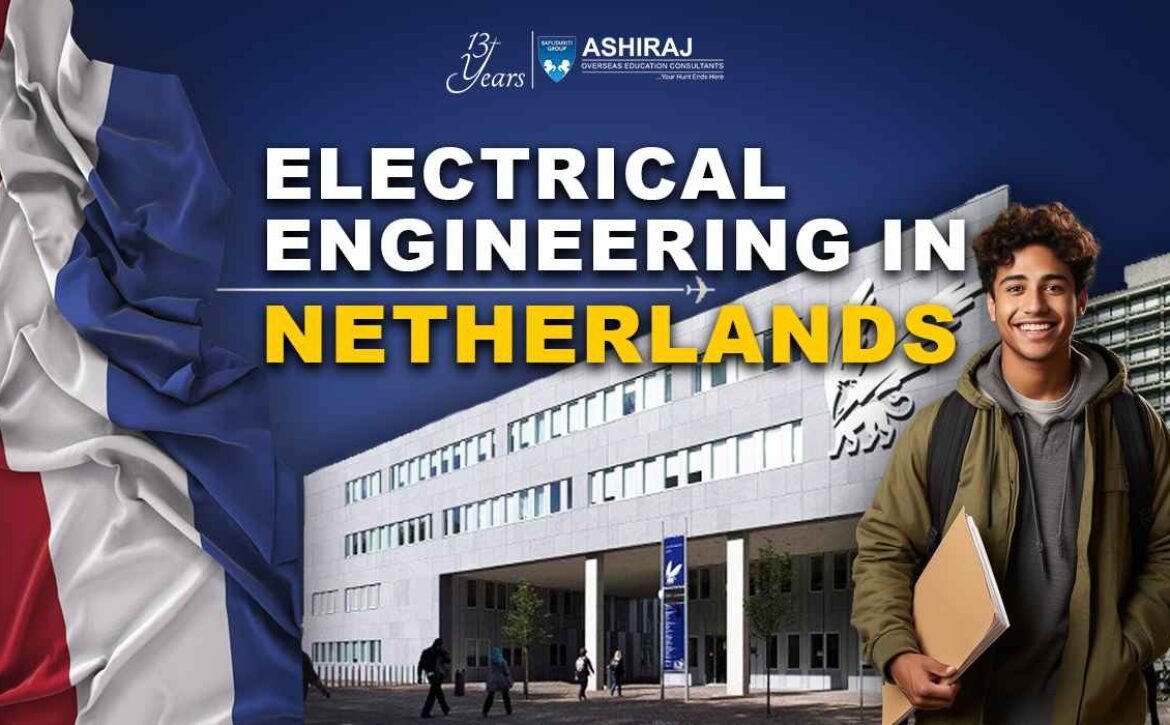
Electrical Engineering in Netherland
Electrical Engineering in the Netherlands offers a dynamic blend of theoretical knowledge and practical applications, making it a sought-after field for aspiring engineers. Renowned Dutch universities provide cutting-edge programs that emphasize innovation in areas like power systems, electronics, and renewable energy technologies. Students benefit from state-of-the-art facilities and collaborative research opportunities with industry leaders, enhancing their skills in problem-solving and project management. The curriculum integrates hands-on experiences and theoretical learning, preparing graduates for diverse career paths in sectors such as telecommunications, automation, and sustainable energy solutions.
In the Netherlands, pursuing Electrical Engineering equips students with a robust foundation in core principles alongside specialized knowledge in emerging technologies. This comprehensive approach not only fosters technical expertise but also cultivates critical thinking and creativity among future engineers. With a focus on sustainability and innovation, studying Electrical Engineering in the Netherlands empowers students to tackle global challenges while contributing to advancements in technology and infrastructure.
Why to Study Electrical Engineering in Netherlands?
- Innovative Curriculum: Dutch universities offer cutting-edge programs in Electrical Engineering that blend theoretical knowledge with practical applications, preparing students for industry challenges.
- Research Opportunities: The Netherlands is a hub for research and development in renewable energy, telecommunications, and high-tech industries, providing ample opportunities for hands-on research projects.
- Global Recognition: Degrees from Dutch universities are internationally recognized, enhancing career prospects both within the Netherlands and globally.
- Industry Collaboration: Students benefit from strong ties between universities and industry leaders, facilitating internships, guest lectures, and collaborative projects that bridge academia and real-world applications.
- Multicultural Environment: Studying in the Netherlands offers a multicultural experience with a diverse student community and English-taught programs, fostering global perspectives and networking opportunities.
- Career Opportunities: Graduates in Electrical Engineering from the Netherlands are in high demand across various sectors, including renewable energy, electronics, automation, and telecommunications.
- Quality of Life: The Netherlands offers a high quality of life, with a progressive society, excellent healthcare, and a strong emphasis on sustainability, making it an attractive destination for international students.
Studying Electrical Engineering in the Netherlands not only provides a solid academic foundation but also equips students with practical skills and industry connections essential for a successful career in the field.
Top Universities to Study Electrical Engineering in Netherlands
Rank | University | QS World University Rankings 2023 | Type of University | Average Annual Fees | Programs Offered |
1 | Delft University of Technology | 50 | Public | €2,168 (EU/EEA) | Bachelor’s, Master’s, PhD in Electrical Engineering, Power Systems, Robotics |
2 | Eindhoven University of Technology | 99 | Public | €2,168 (EU/EEA) | Bachelor’s, Master’s, PhD in Electrical Engineering, Embedded Systems, Telecommunications |
3 | University of Twente | 177 | Public | €2,168 (EU/EEA) | Bachelor’s, Master’s, PhD in Electrical Engineering, Control Systems, Sustainable Energy |
4 | University of Groningen | 129 | Public | €2,168 (EU/EEA) | Bachelor’s, Master’s in Electrical Engineering, Signal Processing, Biomedical Engineering |
5 | Technical University of Eindhoven | 150 | Public | €2,168 (EU/EEA) | Bachelor’s, Master’s, PhD in Electrical Engineering, Photonics, Cyber-Physical Systems |
Note: Average annual fees are approximate and may vary based on specific programs and student residency status (EU/EEA or non-EU/EEA).
Studying Electrical Engineering at these top universities in the Netherlands provides access to world-class education, innovative research opportunities, and a pathway to a successful career in various specialized fields within the industry.
Course Curriculum for Electrical Engineering in Netherlands
- Foundational Courses: The curriculum begins with foundational courses covering mathematics, physics, and basic electrical principles to build a solid theoretical base.
- Core Specializations: Students can choose from specialized tracks such as power systems, electronics, telecommunications, and sustainable energy technologies, tailoring their studies to their career goals.
- Laboratory Work: Practical sessions in state-of-the-art laboratories complement theoretical learning, allowing students to apply concepts learned in lectures to real-world scenarios.
- Project-Based Learning: Emphasis on project-based learning encourages teamwork and problem-solving skills, often collaborating with industry partners on cutting-edge research projects.
- Internships: Many programs include mandatory internships or co-op placements, providing hands-on experience in industry settings and enhancing employability.
- Electives and Seminars: Students can further customize their education with a range of electives and attend seminars by industry experts to stay updated with the latest technological advancements.
- Capstone Projects: The curriculum typically culminates in a capstone project where students integrate their knowledge and skills to solve a significant engineering challenge.
Studying Electrical Engineering in the Netherlands offers a comprehensive education that combines theoretical depth with practical application, preparing graduates for successful careers in diverse sectors of the industry.
Eligibility Criteria & Admission Requirements for MS in Electrical Engineering in Netherlands
- Academic Requirements: Applicants typically need a high school diploma or equivalent with strong grades in mathematics, physics, and other relevant subjects.
- Language Proficiency: Proficiency in English is essential. Applicants must provide scores from either the IELTS (minimum 6.5 overall, with no band less than 6.0) or TOEFL (minimum 90 overall, with at least 20 in each section).
- Standardized Tests: Some universities may require standardized test scores like the GRE or GMAT. Minimum scores vary but generally require GRE scores of at least 155 (Quantitative) and 150 (Verbal), or GMAT scores around 600.
- Passport & Student Visa: International students must possess a valid passport and obtain a student visa to study in the Netherlands. This process involves submitting required documents and meeting visa application criteria.
- Academic Certificates: Transcripts and certificates from previous educational institutions demonstrating academic achievements and qualifications are required for admission consideration.
- Work Experience: While not always mandatory, relevant work experience can strengthen an application, particularly for specialized programs or advanced degrees.
Table Format Example:
Test | Minimum Score |
IELTS | Overall 6.5 |
Minimum 6.0 in each band | |
TOEFL | Overall 90 |
20 in each section | |
GRE | Quantitative: 155 |
Verbal: 150 | |
GMAT | Around 600 |
Meeting these eligibility criteria ensures that prospective students are academically prepared and meet the language proficiency standards necessary for studying Electrical Engineering in the Netherlands.
Documents Required for Studying Electrical Engineering in Netherlands
- Passport: A valid passport is necessary for international students applying to study in the Netherlands.
- Two Letters of Recommendation (LOR): Letters from academic or professional references endorsing the student’s capabilities and suitability for the program.
- Statement of Purpose (SOP): A personal statement outlining the student’s academic background, career goals, and reasons for applying to the program.
- Curriculum Vitae (CV): A detailed resume highlighting academic achievements, work experience, skills, and extracurricular activities.
- Official High School Transcripts: Transcripts showing grades and courses completed during secondary education.
- Certificates: Academic certificates demonstrating completion of previous degrees or qualifications.
- Work Experience Certificate: If applicable, a certificate verifying relevant work experience in the field.
- Proof of Financial Resources: Evidence demonstrating the ability to cover tuition fees, living expenses, and other costs during the study period in the Netherlands.
These documents play a crucial role in the application process, demonstrating the applicant’s qualifications, motivations, and readiness to pursue Electrical Engineering studies at Dutch universities.
Admission Process for Electrical Engineering in Netherlands
- Application Submission: Complete the online application form on the university’s official website, ensuring all required fields are accurately filled.
- Document Submission: Gather and submit necessary documents including academic transcripts, certificates, passport copy, letters of recommendation (LOR), statement of purpose (SOP), curriculum vitae (CV), and proof of language proficiency (IELTS or TOEFL scores).
- Application Fee: Pay the application fee, if applicable, as specified by the university.
- Review and Evaluation: The university reviews all submitted applications comprehensively, assessing academic achievements, test scores, and supporting documents.
- Interview (if required): Some programs may require an interview to further evaluate the applicant’s suitability and motivations for studying Electrical Engineering.
- Admission Decision: Upon review, the university notifies applicants of their admission status. Successful candidates receive a formal offer letter.
- Acceptance and Enrollment: Accepted students must confirm their acceptance of the offer and proceed with enrollment procedures, which may include paying tuition fees and obtaining a student visa.
- Orientation: Attend orientation sessions organized by the university to familiarize yourself with campus facilities, academic requirements, and student support services.
Following these steps ensures a smooth and organized admission process for pursuing Electrical Engineering studies in the Netherlands.
“Education is the most powerful weapon which you can use to change the world.”
Nelson Mandela
Cost of Electrical Engineering Course in Netherlands
- Tuition Fees: Average annual tuition fees for international students range from €8,000 to €15,000, depending on the university and program.
- Living Expenses: Estimated living costs, including accommodation, food, transport, and personal expenses, are approximately €800 to €1,200 per month.
- Books and Supplies: Additional costs for textbooks and study materials may amount to around €500 to €800 per year.
- Health Insurance: International students are required to have health insurance, costing approximately €80 to €120 per month.
- Visa and Residence Permit: Application fees for a student visa and residence permit are typically around €192.
- Other Miscellaneous Expenses: Costs for social activities, travel, and unforeseen expenses should also be budgeted for, amounting to approximately €500 to €1,000 per year.
- Scholarships and Financial Aid: Students can explore scholarships, grants, and part-time job opportunities to help offset costs.
Understanding these financial aspects helps prospective students plan their budget effectively for pursuing Electrical Engineering studies in the Netherlands, ensuring a comfortable and financially sustainable academic experience.
Scholarships for Electrical Engineering Courses in Netherlands
Scholarship Name | Amount | Application Deadline | Eligibility Criteria |
Holland Scholarship | €5,000 to €15,000 | Varies (typically February to May) | Non-EEA international students applying for a Bachelor’s or Master’s program at participating Dutch universities. Requires academic excellence. |
TU Delft Excellence Scholarships | Full tuition fee waiver + living expenses | December 1st (annually) | International students applying for a Master’s program at TU Delft. Based on academic merit and diversity contribution. |
University of Groningen Talent Grant | €3,000 to €12,000 | May 1st (annually) | Non-EU/EEA students applying for a Master’s program at University of Groningen. Requires academic excellence and motivation. |
Amsterdam Merit Scholarship | €5,000 to €15,000 | January 15th (annually) | Non-EU students applying for a Bachelor’s or Master’s program at University of Amsterdam. Based on academic merit. |
Utrecht Excellence Scholarships | Full tuition fee waiver + living expenses | February 1st (annually) | Non-EU/EEA students applying for a Bachelor’s or Master’s program at Utrecht University. Based on academic excellence and motivation. |
Securing these scholarships can significantly alleviate financial burdens for international students pursuing Electrical Engineering studies in the Netherlands. Applying before the deadlines and meeting eligibility criteria are crucial steps to maximize funding opportunities.
Career Opportunities After Electrical Engineering in Netherlands
Job Profile | Average Salary |
Electrical Engineer | €45,000 – €60,000 per year |
Electronics Engineer | €40,000 – €55,000 per year |
Power Systems Engineer | €50,000 – €65,000 per year |
Renewable Energy Engineer | €45,000 – €60,000 per year |
Control Systems Engineer | €45,000 – €60,000 per year |
Electrical Engineering graduates in the Netherlands can pursue diverse career paths across industries such as telecommunications, renewable energy, automation, and more. These roles typically offer competitive salaries, with opportunities for career growth and specialization based on individual skills and experience. The demand for skilled engineers in the Netherlands continues to grow, driven by advancements in technology and sustainability initiatives, making it an attractive destination for aspiring professionals in the field of Electrical Engineering.
Frequently Asked Questions About Electrical Engineering in Netherlands
Applicants typically need a high school diploma, proficiency in English (IELTS or TOEFL scores), and sometimes standardized test scores like GRE or GMAT. Specific requirements vary by university.
Yes, several universities offer scholarships such as the Holland Scholarship, TU Delft Excellence Scholarships, and University-specific grants. Deadlines and eligibility criteria vary, so applicants should check university websites for details.
Annual tuition fees range from €8,000 to €15,000, with additional costs for living expenses, books, and health insurance. Scholarships and part-time work opportunities can help offset these expenses.
Bachelor’s programs typically last three to four years, while Master’s programs can range from one to two years, depending on the university and specific program structure.
Graduates can pursue careers as Electrical Engineers, Electronics Engineers, Power Systems Engineers, Renewable Energy Engineers, and Control Systems Engineers. Salaries range from €40,000 to €65,000 per year, depending on experience and specialization.
While not always mandatory, relevant work experience can strengthen an application, especially for competitive programs or specialized Master’s degrees.
Many universities offer programs taught in English, making them accessible to international students. Proficiency in English (usually demonstrated through IELTS or TOEFL scores) is typically required.
After receiving an admission offer from a Dutch university, students must apply for a student visa/residence permit through the Dutch Immigration and Naturalization Service (IND).
Programs combine theoretical coursework with practical training in state-of-the-art laboratories and often include opportunities for internships or research projects with industry partners.
Yes, international graduates can apply for a residence permit for one year after completing their studies to seek employment or start a business in the Netherlands.




